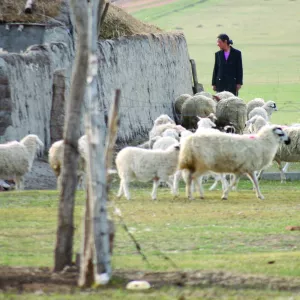Supporting sustainable livestock value chains to restore large rangelands
Rangelands are critical for biodiversity, ecosystem services, and the livelihoods of millions of pastoralists. These uncultivated grasslands, shrublands, woodlands, wetlands, and savannas play very important roles for both domestic and wild animals who use their native vegetation for grazing and survival. However, degradation of these areas is high, and funding for their improvement and restoration is far lower than that

Supporting sustainable livestock value chains to restore large rangelands
Rangelands are critical for biodiversity, ecosystem services, and the livelihoods of millions of pastoralists.
These uncultivated grasslands, shrublands, woodlands, wetlands, and savannas play very important roles for both domestic and wild animals who use their native vegetation for grazing and survival.
However, degradation of these areas is high, and funding for their improvement and restoration is far lower than that for forests.
Enter the Sustainable Investments for Large-Scale Rangeland Restoration (STELARR) project, a groundbreaking initiative tackling this challenge head-on.
Launched in late 2023, STELARR aims to unlock private sector finance for rangeland improvement and restoration through sustainable livestock value chains.
Funded by the Global Environment Facility and co-developed and implemented by the International Union for Conservation of Nature (IUCN), the International Livestock Research Institute (ILRI) and a wide variety of partners, the project works with researchers, communities, civil society organizations, governments, development agencies and the private sector to return profits made from sustainable livestock and livestock value chain products back into the restoration of degraded rangelands.
Currently the project is undertaking a livestock sector analysis to identify the value chains that it will work with including at least one value chain in Latin America, one in Africa and one in the Middle East and Central Asia.
Potential value chains range from cashmere and mohair to gums and resins to pasture-fed beef.
Photo: Sheep farm in northern China (credit: ILRI/Stevie Mann)

